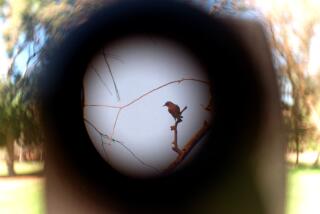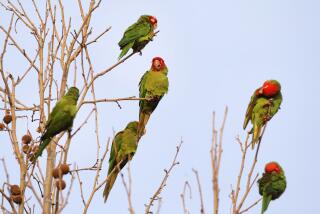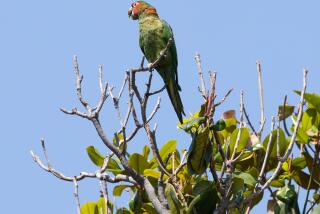In Virginia’s Vulture Culture, Guard Pets and ‘Don’t Lie Down’
- Share via
With a loaded shotgun sitting next to her back door, Lynn O’Hara-Yates says she’s living in terror of the dozens of black vultures that gather each morning on her back fence to stretch their wings, sharpen their talons and wait for lunch.
Recently, “lunch” has meant assorted pets in her Stafford County, Va., neighborhood.
When O’Hara-Yates tried to rescue one of her ducks last month, a vulture swooped down, whooshing within three feet of her head. The birds attacked again this week as she filmed them circling over children getting off a school bus.
“It’s like something out of (Alfred Hitchcock’s) ‘The Birds,’ ” the 42-year-old flight attendant said. “They’re scary as hell.”
Residents of the Kings Grant development have counted about 200 vultures roosting in their neighborhood.
When the first birds showed up in November, they were a curiosity. As their numbers multiplied, curiosity turned into concern despite assurances from state wildlife specialists and longtime residents that the huge birds wouldn’t harm a living thing.
In the last month, O’Hara-Yates has lost eight ducks from her pond, all of them picked clean to the bone. Her neighbor’s cat, Stripe, was grabbed by the tail and carried 25 feet in the air for a distance of 100 yards. A vet stitched up the four talon holes in Stripe’s body. Dogs and horses also have been attacked.
“It’s a nightmare,” said Stripe’s owner, Jeude Barrett. “And we can’t do anything. . . . They have no fear.”
Residents say they’ve been told that the harsh winter has exacerbated the problem, reducing the amount of “road kill” on which the birds normally dine.
Vultures are federally protected animals and cannot be killed without a permit.
Most of those spotted in Kings Grant are black vultures, which weigh about five pounds and have a wingspan up to six feet. Black vultures are more aggressive than their cousin, the red-headed turkey vulture, and are common to the South, according to Paul Engman, a naturalist who works for the Fairfax County Park Authority.
The birds, commonly called buzzards, prefer their food either dead or dying, Engman said, but on rare occasions have been known to swoop down on live animals.
Bob Thomas, an inspector for the Virginia Department of Agriculture and Consumer Services, says he has seen horses, lambs, pigs and newborn calves attacked. Incidents have been reported in four other Virginia counties.
Thomas, who is working to rid the Kings Grant area of its vultures, said he understands residents’ concerns. “I would not be comfortable with a 2-year-old child playing around them. When they’re hungry, meat’s meat.”
O’Hara-Yates said a game warden advised her that she would be safe while feeding the animals on her 14-acre property, but, he warned, “Whatever you do, don’t lie down.”
More to Read
Sign up for Essential California
The most important California stories and recommendations in your inbox every morning.
You may occasionally receive promotional content from the Los Angeles Times.













